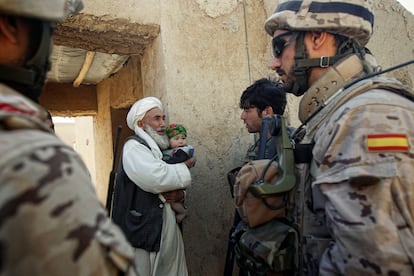Spain prepares to evacuate Afghans who worked with Spanish military and aid agencies
The Interior Ministry and CNI intelligence services are sifting through the evacuation candidates to ensure no jihadist extremists infiltrate the operation


With Afghanistan collapsing in the face of the advance of the resurgent Taliban, the Spanish government is preparing to evacuate the Afghans who worked for Spain’s military and civilian operations and European Union missions.
Those eligible to be evacuated fear for their lives for having collaborated with “the foreign occupation” as the insurgents advance in an unstoppable offense, seizing 10 of the 34 of the country’s provincial capitals falling in the space of a week.
The operation, which is being planned by the ministries of Foreign Affairs, Defense and the Interior, not only involves the air transfer of the evacuees from Kabul to Spain, but also the more complex business of their arrival in Spain and regularizing their legal status. According to sources, the Interior Ministry leaning towards providing the Afghans with international protection rather than refugee status. The Interior Ministry and Spain’s CNI intelligence services are also sifting through all the evacuation candidates in order to rule out any infiltration from jihadist extremists.
The Spanish Air Force already has an A400M transport plane ready to pick up the evacuees in Kabul as soon as the command is issued
The numbers to be evacuated in the operation are not yet available, but could amount to 100 and, though there are still details to be worked out, the Spanish Air Force already has an A400M transport plane ready to pick up the evacuees in Kabul as soon as the command is issued, which should come no later than August 30.
According to government sources, there are three specific target groups for evacuation. The first is made up of Afghans who worked for the Spanish armed forces, which maintained a contingent in Afghanistan at the cost of 102 lives and €3.5 billion from 2002 until May 13 this year when the last 24 soldiers returned. The second is made up of those hired by the Spanish Agency for International Cooperation and Development (AECID), which carried out projects in Afghanistan between 2006 and 2013. And the last group includes local personnel working with the European Union. Not being a state, the EU does not have the legal machinery to enable it to accept refugees, so it has asked its member states to welcome Afghans who served in the European mission and may be at risk.
Spain and other Western countries could also offer refugee status to Afghans who, because of their public status as journalists and politicians, are more likely to be targeted by the Taliban. Each refugee has the right to bring his or her family, which makes it difficult to predict a final figure.
There are also requests from translators used by the Spanish Army. In September 2013, Spanish forces withdrew from Badghis province, in the northwest of the country, and months later, after a support campaign that collected tens of thousands of signatures, the government agreed to take in almost 30 of the 40 translators working for the troops. A total of 41 Afghans were subsequently transferred to Spain, a figure that included family members.
A few weeks ago, a dozen of the Afghan interpreters who opted to stay behind at that time, believing the security achieved would be maintained, delivered a letter to the Spanish Embassy in Kabul requesting evacuation to Spain; they claim that their lives are now in danger and that they have received threatening calls accusing them of being traitors, according to the Spanish media site, Vozpópuli.
Spain is not the only country preparing to take in the Afghans who worked for its military or aid agencies. Numerous countries have already launched their evacuation programs. The German Defense Ministry announced that it has delivered travel documents for 446 local recruits and their families. Meanwhile, a first flight carrying 200 Afghans of the approximately 20,000 who worked for the US Army landed on July 30 at Dulles airport in Washington DC.
English version by Heather Galloway.
Tu suscripción se está usando en otro dispositivo
¿Quieres añadir otro usuario a tu suscripción?
Si continúas leyendo en este dispositivo, no se podrá leer en el otro.
FlechaTu suscripción se está usando en otro dispositivo y solo puedes acceder a EL PAÍS desde un dispositivo a la vez.
Si quieres compartir tu cuenta, cambia tu suscripción a la modalidad Premium, así podrás añadir otro usuario. Cada uno accederá con su propia cuenta de email, lo que os permitirá personalizar vuestra experiencia en EL PAÍS.
¿Tienes una suscripción de empresa? Accede aquí para contratar más cuentas.
En el caso de no saber quién está usando tu cuenta, te recomendamos cambiar tu contraseña aquí.
Si decides continuar compartiendo tu cuenta, este mensaje se mostrará en tu dispositivo y en el de la otra persona que está usando tu cuenta de forma indefinida, afectando a tu experiencia de lectura. Puedes consultar aquí los términos y condiciones de la suscripción digital.








































